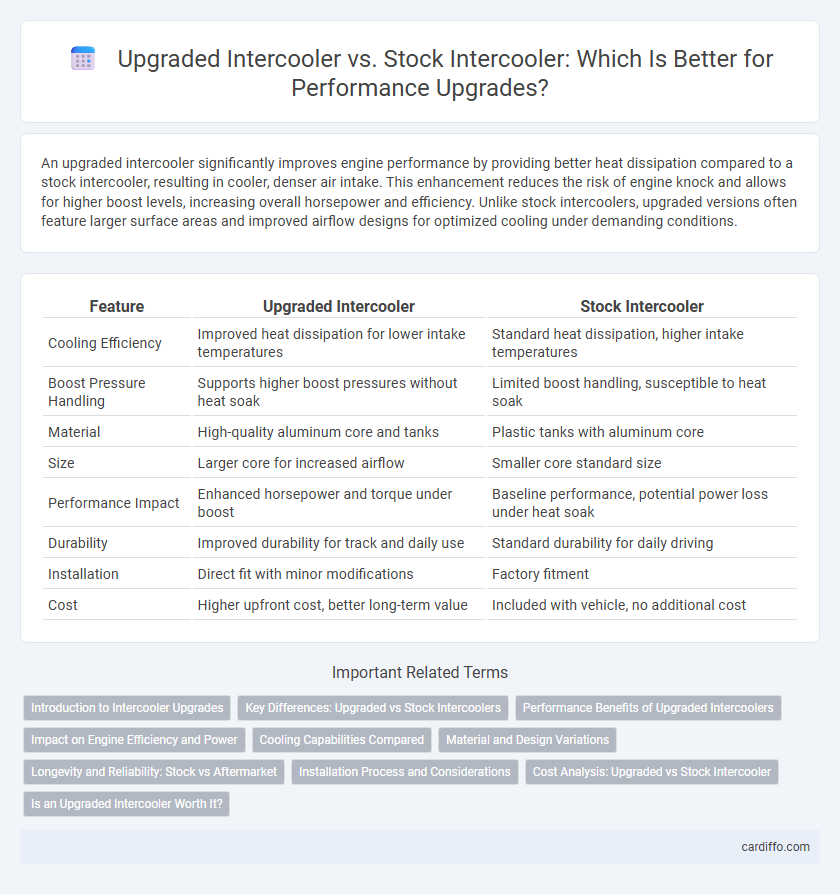An upgraded intercooler significantly improves engine performance by providing better heat dissipation compared to a stock intercooler, resulting in cooler, denser air intake. This enhancement reduces the risk of engine knock and allows for higher boost levels, increasing overall horsepower and efficiency. Unlike stock intercoolers, upgraded versions often feature larger surface areas and improved airflow designs for optimized cooling under demanding conditions.
Table of Comparison
| Feature | Upgraded Intercooler | Stock Intercooler |
|---|---|---|
| Cooling Efficiency | Improved heat dissipation for lower intake temperatures | Standard heat dissipation, higher intake temperatures |
| Boost Pressure Handling | Supports higher boost pressures without heat soak | Limited boost handling, susceptible to heat soak |
| Material | High-quality aluminum core and tanks | Plastic tanks with aluminum core |
| Size | Larger core for increased airflow | Smaller core standard size |
| Performance Impact | Enhanced horsepower and torque under boost | Baseline performance, potential power loss under heat soak |
| Durability | Improved durability for track and daily use | Standard durability for daily driving |
| Installation | Direct fit with minor modifications | Factory fitment |
| Cost | Higher upfront cost, better long-term value | Included with vehicle, no additional cost |
Introduction to Intercooler Upgrades
Upgraded intercoolers enhance engine performance by providing superior cooling compared to stock intercoolers, reducing intake air temperatures and increasing air density. Improved thermal efficiency allows for more consistent power output and minimizes the risk of heat soak during high-performance driving. Intercooler upgrades typically involve larger core sizes, better airflow designs, and advanced materials to optimize heat dissipation.
Key Differences: Upgraded vs Stock Intercoolers
Upgraded intercoolers feature larger core sizes and enhanced fin designs that improve heat dissipation compared to stock intercoolers, resulting in lower intake air temperatures and increased engine efficiency. These performance enhancements reduce turbo lag and prevent heat soak during extended high-boost operation, delivering more consistent power output. In contrast, stock intercoolers are designed primarily for reliability and cost-effectiveness, often limiting airflow and cooling capacity under aggressive driving conditions.
Performance Benefits of Upgraded Intercoolers
Upgraded intercoolers provide improved heat dissipation compared to stock intercoolers, resulting in lower intake air temperatures and increased engine efficiency. Enhanced cooling capacity helps prevent heat soak during extended high-performance driving, maintaining consistent boost pressure and power output. This leads to noticeable gains in horsepower, throttle response, and overall engine reliability under demanding conditions.
Impact on Engine Efficiency and Power
Upgraded intercoolers significantly improve engine efficiency and power by reducing intake air temperatures more effectively than stock intercoolers, resulting in denser air charge and enhanced combustion. Enhanced cooling capacity minimizes heat soak during prolonged high-performance driving, maintaining consistent boost pressure and preventing engine knock. This optimized thermal management directly translates into higher horsepower, improved throttle response, and greater overall engine reliability.
Cooling Capabilities Compared
An upgraded intercooler features larger core volume and enhanced fin density, significantly improving heat dissipation compared to a stock intercooler. This increase in cooling capacity reduces intake air temperatures, leading to denser air charge and improved engine performance under high-boost conditions. Efficient heat exchange minimizes the risk of heat soak, maintaining consistent power delivery during extended driving or track use.
Material and Design Variations
Upgraded intercoolers typically feature high-quality aluminum cores with enhanced fin density and thicker end tanks, improving heat dissipation compared to stock intercoolers made of thinner aluminum or plastic end tanks. Design variations include larger core sizes and bar-and-plate configurations that optimize airflow and reduce pressure drop, resulting in more efficient cooling performance. These material and design enhancements contribute to lower intake temperatures, increased power output, and improved overall engine reliability.
Longevity and Reliability: Stock vs Aftermarket
Upgraded intercoolers typically feature enhanced materials and improved core designs that significantly increase heat dissipation, resulting in lower intake air temperatures and reduced thermal stress on engine components compared to stock intercoolers. These improvements extend the longevity and reliability of the engine by maintaining optimal operating temperatures under high-performance or prolonged driving conditions. Stock intercoolers, while adequate for everyday use, often suffer from limited cooling capacity and wear faster due to less robust construction, making aftermarket intercoolers a preferred choice for durability and consistent performance.
Installation Process and Considerations
Upgraded intercoolers typically require more complex installation processes compared to stock intercoolers due to their larger size and enhanced performance features. Careful consideration must be given to fitment, mounting points, and potential modifications to surrounding components to ensure optimal airflow and cooling efficiency. Proper installation also demands attention to intercooler piping alignment and secure connections to prevent pressure leaks and maintain consistent boost levels.
Cost Analysis: Upgraded vs Stock Intercooler
Upgraded intercoolers typically cost between $300 and $800, offering enhanced cooling efficiency and improved engine performance compared to stock intercoolers, which usually range from $100 to $300. While the initial investment for an upgraded intercooler is higher, the long-term benefits include reduced engine wear and potential fuel savings, potentially offsetting the upfront cost. Stock intercoolers provide adequate performance for everyday driving but may struggle under high-boost or modified conditions, leading to less cost-effectiveness over time.
Is an Upgraded Intercooler Worth It?
An upgraded intercooler significantly enhances engine performance by improving air cooling efficiency, resulting in denser air intake and increased horsepower compared to a stock intercooler. Enhanced heat dissipation reduces the risk of heat soak during intense driving, ensuring more consistent power output and improved turbocharger longevity. For enthusiasts seeking reliable performance gains and better thermal management, investing in an upgraded intercooler is typically worth the cost.
Upgraded Intercooler vs Stock Intercooler Infographic

 cardiffo.com
cardiffo.com